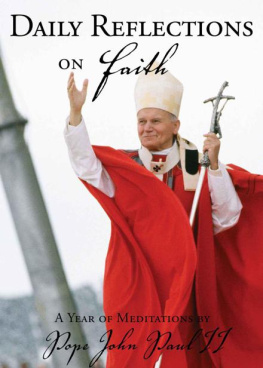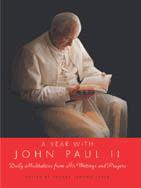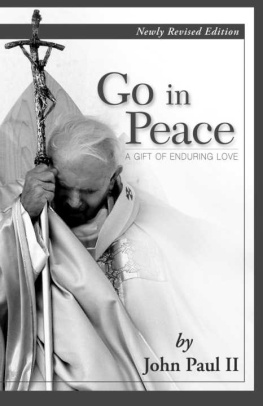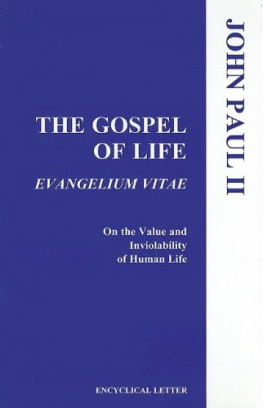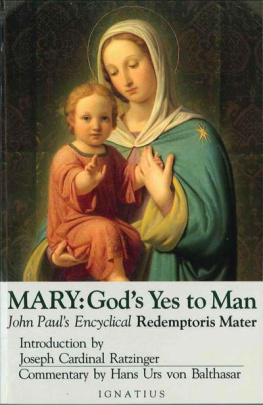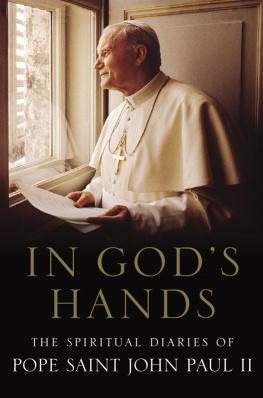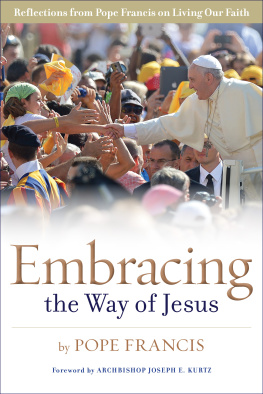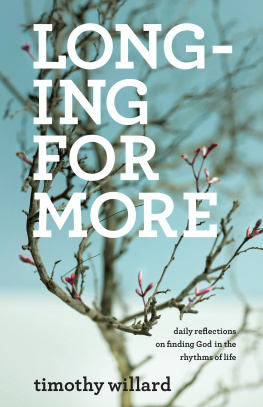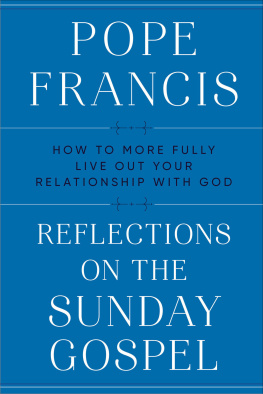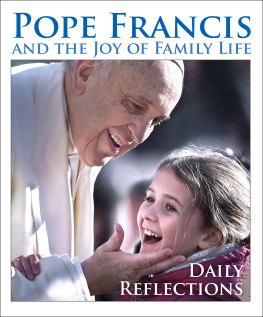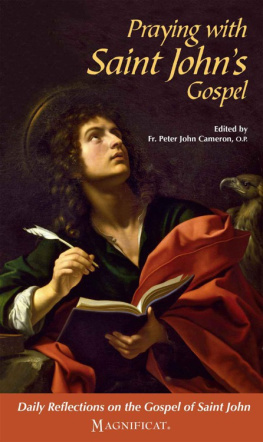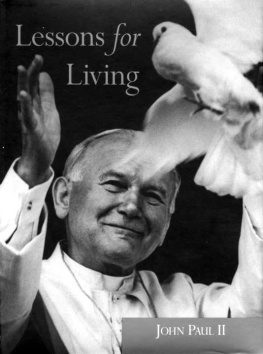Pope John Paul II - Daily Reflections on Faith
Here you can read online Pope John Paul II - Daily Reflections on Faith full text of the book (entire story) in english for free. Download pdf and epub, get meaning, cover and reviews about this ebook. year: 2013, publisher: United States Conference of Catholic Bishops (USCCB), genre: Religion. Description of the work, (preface) as well as reviews are available. Best literature library LitArk.com created for fans of good reading and offers a wide selection of genres:
Romance novel
Science fiction
Adventure
Detective
Science
History
Home and family
Prose
Art
Politics
Computer
Non-fiction
Religion
Business
Children
Humor
Choose a favorite category and find really read worthwhile books. Enjoy immersion in the world of imagination, feel the emotions of the characters or learn something new for yourself, make an fascinating discovery.
- Book:Daily Reflections on Faith
- Author:
- Publisher:United States Conference of Catholic Bishops (USCCB)
- Genre:
- Year:2013
- Rating:5 / 5
- Favourites:Add to favourites
- Your mark:
- 100
- 1
- 2
- 3
- 4
- 5
Daily Reflections on Faith: summary, description and annotation
We offer to read an annotation, description, summary or preface (depends on what the author of the book "Daily Reflections on Faith" wrote himself). If you haven't found the necessary information about the book — write in the comments, we will try to find it.
Daily Reflections on Faith — read online for free the complete book (whole text) full work
Below is the text of the book, divided by pages. System saving the place of the last page read, allows you to conveniently read the book "Daily Reflections on Faith" online for free, without having to search again every time where you left off. Put a bookmark, and you can go to the page where you finished reading at any time.
Font size:
Interval:
Bookmark:
Edited by Leonardo Sapienza
Libreria Editrice Vaticana
United States Conference of Catholic Bishops
Washington, DC
In the homily on Holy Thursday in front of hundreds of priests gathered in the Basilica of St. Peter for the traditional Chrism Mass, during which the promises of priestly ordination are renewed, Pope Benedict XVI made mention of the Year of Faith. In the context of a widespread religious illiteracy that no longer knows the fundamental content of the faith, he said: The Year of Faith, commemorating the opening of the Second Vatican Council fifty years ago, should provide us with an occasion to proclaim the message of faith with new enthusiasm and new joy. We find it of course first and foremost in Sacred Scripture, which we can never read and ponder enough. Yet at the same time we all experience the need for help in accurately expounding it in the present day, if it is truly to touch our hearts. This help we find first of all in the words of the teaching Church: the texts of the Second Vatican Council and the Catechism of the Catholic Church are essential tools which serve as an authentic guide to what the Church believes on the basis of Gods word. And of course this also includes the whole wealth of documents given to us by Pope John Paul II, still far from being fully explored. The final expression is quite striking, with reference to the manifold and rich Magisterium of his predecessor, which still deserves to be known and fully explored.
These pages prepared by Leonardo Sapienza on the symphony of the faith are a prompt reply to the call of Benedict XVI.
Among the themes of great impact that John Paul II left to us, that of faith remains one of the richest and most fundamental. Not only because of the importance of the theme, but above all because of the testimony that he gave to it. His faith in Jesus Christ, in fact, shone through his words and actions and permitted all, believers and nonbelievers, to grasp a common foundation to which to make reference beyond their differences. It is enough to refer to his Encyclical Fides et Ratio in order to touch with our hands his conviction and his desire that the faith should be the irreplaceable companion of life for our contemporary world, so often confused, indecisive, and weak. Those words of his still resound today as a great provocation: This does not mean that the link between faith and reason as it now stands does not need to be carefully examined, because each without the other is impoverished and enfeebled. Deprived of what Revelation offers, reason has taken side-tracks which expose it to the danger of losing sight of its final goal. Deprived of reason, faith has stressed feeling and experience, and so runs the risk of no longer being a universal proposition. It is an illusion to think that faith, tied to weak reasoning, might be more penetrating; on the contrary, faith then runs the grave risk of withering into myth or superstition. By the same token, reason which is unrelated to an adult faith is not prompted to turn its gaze to the newness and radicality of being (Fides et Ratio, no. 48).
These are words of great truth that can be experienced every day. From this point, nonetheless, must be revived a common effort to restore to faith its role as a guide in the lives of persons. No one, especially today, can refuse to be a pilgrim on the roads of our increasingly small world with faith as a traveling companion. The alternative, unfortunately, would be that of becoming wanderers without destination or direction.
As is well known, John Paul II often expressed his most intimate thoughts in the language of poetry. Rereading a few of the verses of his Roman Triptych could permit a better grasp of his perspective. The verses entitled The Source become, perhaps, the most direct reference to the theme of faith:
The undulating wood slopes down
to the rhythm of mountain streams...
If you want to find the source,
you have to go up, against the current.
Break through, search, dont yield,
you know it must be here somewhere.
Where are you?... Source, where are you?!
Silence...
Stream, woodland stream,
tell me the secret
of your origin!
(Silencewhy are you silent?
With what care you have hidden the mystery
of your origin!)
Let me wet my lips
in spring water,
to feel its freshness,
its life-giving freshness.
Simple verses full of beauty that penetrate the mystery and provoke the readers to seek always, without tiring, until they find solace in the contemplation of the beauty of the mystery to which faith leads.
Blessed John Paul II was able to speak about faith in such a profound and persuasive way because he was first of all a man of faith. In the most difficult moments, when suffering was getting the upper hand, his trusting abandonment to the Lord appeared clearly in his face. Never as in his case has the profound unity between life and teaching become so effective, inspiring an intense and permanent movement that above all in thousands of young people has given life to the experience of the New Evangelization. This, in fact, remains the most immediate expression of faith that becomes participation in the joy discovered. When one has finally found the answer to the great questions that touch on the meaning of life, sharing it with others becomes a moral obligation. Faith, however, allows one to go beyond obligation. It is a sharing by its very nature because it allows one to see in the face of the other, the brother or sister for whom Christ gave his life out of love. Faith leads to this experience of love because it is born from love, is nourished by it, and lives it as an offering of total self-donation to the point of becoming mercy for those who are in need of forgiveness.
With these pages, Leonardo Sapienza allows one not only to enter into the richness of the teaching of John Paul II but also to make a journey of true catechesis. By beginning to identify the why of faith and in what it consists, he leads one step by step to discovering its presence in the various moments of life, to the point of understanding that only by believing and abandoning oneself to the mystery can one perceive the greatness of the gift received. With untiring zeal, Leonardo Sapienza has published over the course of the years valuable collections of aphorisms that span the various contents of faith and Christian witness. With Daily Reflections on Faith, he renders a great service to the Year of Faith. Meditating on these pages will reinforce our enthusiasm for growing in faith and presenting a consistent witness of this, so that the world may believe.
 RINO FISICHELLA
RINO FISICHELLA
PRESIDENTOFTHE PONTIFICAL COUNCILFORTHE
PROMOTIONOFTHE NEW EVANGELIZATION
While certainly acknowledging the fact that the Church presents her teaching with varying degrees of magisterial authority, it is necessary to recover a sense of the wholeness and interior logicthe symphony of the faith. Undoubtedly the greatest service you can render to the Church at this present time is to make every effort to present anew the fullness and beauty of the apostolic faith, and thereby end the disharmony and confusion produced by teachings on questions of faith, morals and discipline which are at odds with the Church's Magisterium. JOHN PAUL IIMARCH 20, 1993On March 13, 1985, John Paul II began a cycle of catechesis on faith, which he continued in all of the general audiences of that year.
The core of these weekly catecheses was the relationship between faith and secularization.
John Paul II expressed his concern: The people of today, blinded by progress and prosperity, often look only to the earth; they no longer know how to look above the world in which they are enclosed: they accept secularization. They intentionally organize their lifestyles solely as a function of the realities of this world, without paying any attention to God and his will. This has always been with us, this same temptation to forget about God, or at least to live as if God did not exist (Homily, May 16, 1985).
Font size:
Interval:
Bookmark:
Similar books «Daily Reflections on Faith»
Look at similar books to Daily Reflections on Faith. We have selected literature similar in name and meaning in the hope of providing readers with more options to find new, interesting, not yet read works.
Discussion, reviews of the book Daily Reflections on Faith and just readers' own opinions. Leave your comments, write what you think about the work, its meaning or the main characters. Specify what exactly you liked and what you didn't like, and why you think so.

